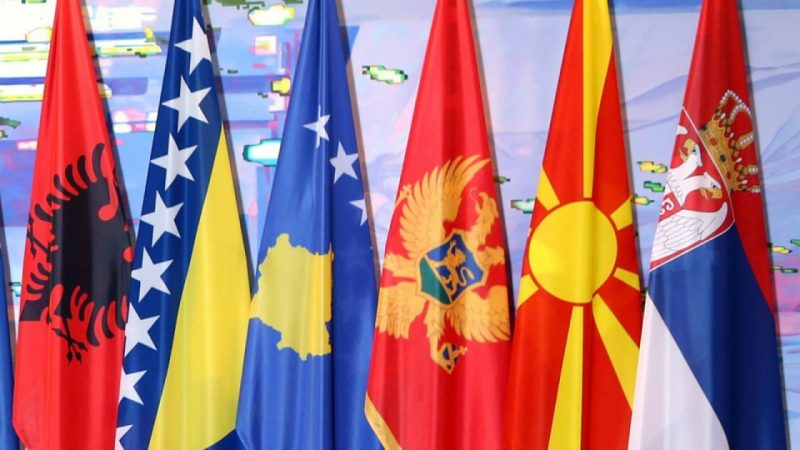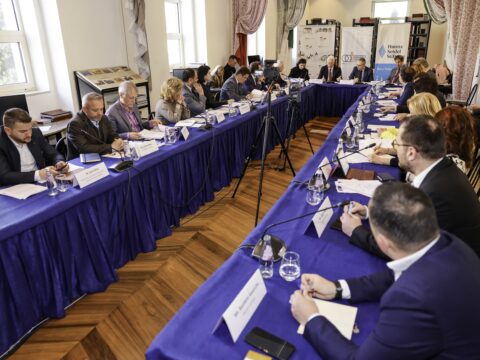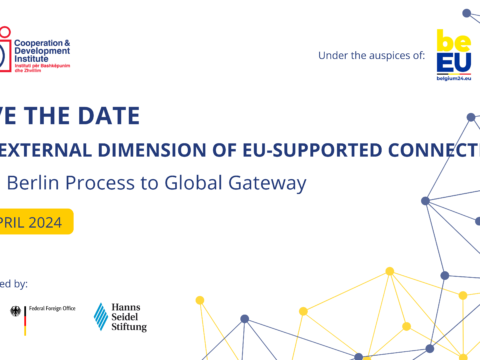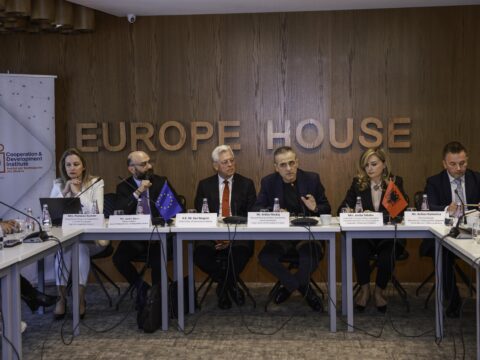Photo Credit: The flags of the Western Balkan six: from left to right Albania, Bosnia and Herzegovina, Kosovo, Montenegro, North Macedonia, Serbia, [Westminster Foundation for Democracy]
Published by a group of authors at Euractiv on June 21 2021
Civil society has an important role to play to make sure that corruption in infrastructure projects and wrong prioritisation do not derail a €30 billion EU financial plan for the Western Balkans, a group of authors write.
The authors – Albana Rexha, Aleksandar Macura, Ana Krstinovska, Ardian Hackaj, Gresa Smolica, Jelica Minic, and Marko Sosic – represent think tanks fighting for integrity compliance in infrastructure projects.
Up to €30 billion will be the financial muscle put at the service of recovery, economic development and green transition in the Western Balkans countries (WB6) for the next seven years, out of which €9 billion will be grants provided by the EU.
It represents a qualitative jump in the financial assistance to the region towards a project-based development model that goes parallel with country reforms.
However what has not been reformed, at least until the moment that these lines are written, is the governance of the mechanism that makes possible the prioritization of most relevant projects so as to ensure their efficiency.
While a meticulous effort and significant resources are earmarked for the preparation of mature financing dossiers, homegrown problems that directly impact their successful implementation are dealt with only partially, and very often, not at all.
State capture, mentioned as a WB6 structural weakness in the 2018 EU progress reports, has not been identified as a “key aspect” conditioning the success of the EIP in the WBIF meeting in December 2020.
The need for specific EU conditionality regarding the €30 billion disbursement has been partially recognized through the need for accompanying reforms, without specifying the benchmarks, or the “carrot and stick” mechanism. The increasing presence of third actors in the region does not appear in the WBIF risk list either.
An Action Plan for Delays acknowledges many challenges to speedy project implementation such as changes in project requirements, low quality of preparation, changes of procurement strategies, low inclusion of beneficiaries, and alteration of priorities following the change of governments.
But the proposed mitigation strategies are limited to the establishment of a “traffic light monitoring and reporting system”. Albeit increasing the transparency, the system stops short of treating the cause of the identified problems.
The Connectivity Agenda problems are a spillover of the homegrown governance problems. When we talk about good governance in infrastructure projects, we are talking about the practical and tangible implications of the application of the rule of law in the everyday life of WB6 citizens.
In the new Enlargement methodology, the progress achieved in the Fundamentals cluster conditions the advancement of negotiations in the Transport, Energy or Digital chapters, and is reported as such.
But in the case of EU supported infrastructure, the WB6 citizens will not need to consult the EU Progress reports to learn about the adoption of the acquis or progress of reforms, and how they may impact his or her life. They’ll assess its utility immediately as they’ll use it (or not) every day.
On top of its direct impact on the citizen, infrastructure is the soft underbelly of Enlargement as it can derail the whole economic conditionality embedded into the Economic and Reforms progress of the WB6 countries.
Wrong infrastructure prioritization can affect mid-term economic projections; financial overstretch in project financing and any resulting liabilities will impact the 3-year budgetary plans; corruption in public works will endanger the structural reform agendas.
Moreover, the emergence of connectivity initiatives around the world will undoubtedly be felt in the WB6.
In the region, we are witnessing parallel prioritization pipelines: one that produces the mature projects as per the EU methodology, and other ones that priorities and finance infrastructure projects through alternative mechanisms and criteria different and unrelated to EU’s.
The availability of alternative financing sources for projects that do not fulfil EU criteria, weakens the EU conditionality factor.
The Berlin process with its focus on connectivity has brought at the forefront the role that infrastructure has in Enlargement, not only because of its huge financial envelope but also in making tangible the transformative power of the EU.
Finally, since 2014, we are talking about specific projects in specific localities and not only about the size of funds transferred from the EU to WB6 governments. WB6 citizens now know better where a sizable chunk of EU money goes to.
They can also compare EU- backed projects with government-run ones and check out the differences in cost and quality.
Specialised think tanks have jumped into this opportunity and have produced since 2015 different monitoring reports, assessments analysis and come up with proposals.
They have brought their unique knowledge of the local context and their expertise in bringing out the rule of law challenges that directly impact the infrastructure projects of connectivity agenda.
Consequences of special laws drafted to contract infrastructure projects and absence of a national development plan in Serbia, political prioritization of highway tracks in Kosovo, alternative national project pipelines in Montenegro, low quality of project preparation in North Macedonia, environmental impact in Bosnia, substantial use of PPP and change of project parameters in Albania have all been raised and discussed in the Civil Society Forum organized in Berlin in June 2021.
Those phenomena impact the Fundamentals cluster of the WB6 conditions to be fulfilled for smooth progress towards convergence with EU and full membership.
By intervening in the way WB6 infrastructure is planned and implemented, WB6-specialised think tanks and civil society organisations (CSOs) are trying to bridge the democratic deficit in policy making, all by contributing to the efficiency of how EU taxpayers money is spent in our region.
The current EU review of the way the budget of €12.9 billion will be spent in the next seven years is an excellent opportunity to take into account the irreplaceable role that WB6 CSO-s have.
Mainstreaming the Fundamentals into the Economic and Investment Plan will not be successful without the involvement and empowerment of WB6 citizens. Local think tanks and CSO-s are a key actor in this endeavor.
*This article was originally published by Euractiv.






